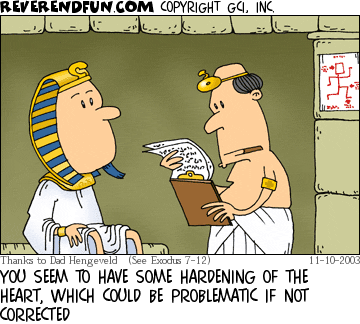|
PredestinationPredestination vs. Fate Do you believe in fate? What is fate exactly? Fate is the idea that God is completely sovereign, so therefore man can always justify their sins and evil by saying “God forced me to do it.” However, this idea does not account for the fact that God gave man some authority. We have authority of our actions. If you think about it, we have many choices and actions we can control which we feel like God does not have an influence on. For example, what time we wake up, what clothes we wear, what kind of toothpaste we use, etc. God gave us authority over these things. Here is another way of looking at it: God has a will and a plan. Man can resist God’s will by sinning or doing evil, but man cannot resist God’s plan. God will achieve His plan despite all the resisting we do. The most famous example of this is Pharaoh:
Exodus 7:2-5 – thou – thou dost speak all that I command thee, and Aaron thy brother doth speak unto Pharaoh, and he hath sent the sons of Israel out of his land. And I harden the heart of Pharaoh, and have multiplied My signs and My wonders in the land of Egypt, and Pharaoh doth not hearken, and I have put My hand on Egypt, and have brought out My hosts, My people, the sons of Israel, from the land of Egypt by great judgments; and the Egyptians have known that I [am] Jehovah, in My stretching out My hand against Egypt; and I have brought out the sons of Israel from their midst. (YLT) Exodus 10:1 – And Jehovah saith unto Moses, Go in unto Pharaoh, for I have declared hard his heart, and the heart of his servants, so that I set these My signs in their midst, (YLT) Exodus 10:20 – and Jehovah strengtheneth the heart of Pharaoh, and he hath not sent the sons of Israel away. (YLT) In this story, Egypt had enslaved all of the Israelites and Moses kept asking Pharaoh to let his people go. Every time, Pharaoh said “no,” despite the numerous plagues that God sends Egypt. However, we see in these verses that God was the one that “hardened” Pharaoh’s heart, and He took credit for it. Pharaoh did not know what was going on. He thought he was hardening his own heart out of his own “free will.” In Exodus 10:1 we see that God even told Moses that He hardened Pharaoh’s heart. So as an overcomer, Moses knew God’s plan, and he knew God was hardening Pharaoh’s heart in the background. In Exodus 7:5, God says he did this so that people will know He exists. If God only did one plague, then people can say it was a coincidence. Pharaoh used his own authority to resist God’s will of Israel leaving Egypt. However, in the end, God’s plan triumphed over Pharaoh’s authority, because God has greater authority. So let’s go back to man’s authority. God gave each person some level of authority and accountability. With that authority, comes responsibility, and therefore judgment. On the Great White Throne of judgment, God will judge all (including Pharaoh) based on each individual’s authority. Although God has predestined everything, it doesn’t mean we are not responsible for our actions. Therefore, do not fall into the trap of fate, but embrace predestination. For more details on God’s judgment see the Lake of Fire and The Barley Overcomers. God Draws Us to Him Some of you have probably heard of the worship song: “Draw Me Close,” who’s first line is “Draw me close to you, Never let me go.” This idea of God drawing us to Him supports predestination. It is also Biblical: John 6:44 - No man can come to me, except the Father which hath sent me draw (helko) him: and I will raise him up at the last day. (KJV, comment added) John 12:32 – And I, if I be lifted up from the earth, will draw (helko) all men unto me. (KJV, comment added) John 6 says that no man can be saved by his own will. John 12 is referring to Jesus lifted up on the cross. So both verses are referring to the fact that God saves man out of His will, not our own. The Greek word used in these verses is helko. According to Strong’s Concordance of the King James, helko is used 8 times and is translated as draw or drew all 8 times. Here are some other examples of the use of helko: John 21:6 – And he said unto them, Cast the net on the right side of the ship, and ye shall find. They cast therefore, and now they were not able to draw (helko) it for the multitude of fishes. (KJV, comment added) James 2:6 – But ye have despised the poor. Do not rich men oppress you, and draw (helko) you before the judgment seats? (KJV, comment added) In John 21, the word helko is used to mean capturing fish in a net. In James, it is used to force a poor man into court. So the meaning of the word is very clear. It is not a matter of free choice or even partial choice. God clearly forces people to be saved from the lake of fire by His own will, not of man’s will. Page 2 of 5 |
Subscribe to Bible Truth Newsletter:





